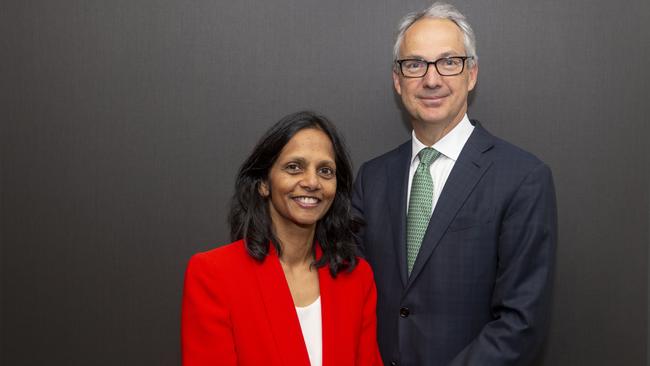Shemara Wikramanayake vows ‘business as usual’ at Macquarie
Macquarie Group’s incoming chief executive, Shemara Wikramanayake, has declared her reign will be ‘business as usual’.

Macquarie Group’s incoming chief executive, Shemara Wikramanayake, has declared her reign will be “business as usual” as she looks to build on the legacy of 49 years of unbroken profit at Australia’s biggest homegrown investment bank and further the advancement of women in the industry.
Ms Wikramanayake was confirmed as Macquarie’s sixth CEO yesterday in a move that makes her one of the most powerful women in the industry globally, from where the bank sources two-thirds of its profits.
The succession marks the end of the 10-year era under Nicholas Moore, who steered the bank through the global financial crisis, using the disruption as an opportunity for international expansion and a move into steady annuity-style income businesses such as funds management and corporate finance.
Mr Moore will depart in November as the bank’s 10th-largest shareholder with 2.06 million shares worth $251 million, accumulated in a 32-year career at Macquarie that earned him an estimated hundreds of millions of dollars in pay and bonuses. The value of his holding fell $6.6m yesterday as some investors baulked at the uncertainty of a change in leadership.
Analysts and shareholder Argo Investments applauded the move, saying Ms Wikramanayake had been the standout candidate to succeed Mr Moore for five years.
“I think that the market would be pretty comfortable with it,” said Jason Beddow, chief investment officer at Argo. “She has done a pretty good job with the business as Macquarie has evolved into a different beast.”
Chairman Peter Warne said Mr Moore had been “immensely successful”.
“Nicholas has been central to Macquarie’s growth and evolution over many years, transforming the group into the global, diversified business it is today,” Mr Warne said. “Shemara takes over a business with significant momentum and market-leading positions and does so with the international track record, vision and strong sense of our unique culture to make this a very successful transition.”
Ms Wikramanayake, who rises from 10 years running the bank’s biggest business, Macquarie Asset Management, moved to reassure shareholders at the annual meeting in Sydney yesterday that the business was in great shape.
“People ask me why Nicholas is going,” Ms Wikramanayake said from the floor of the meeting after being called by shareholders to address them. “He is going because he is comfortable with the momentum in this business that he has given 32 years to developing, and he is comfortable that not just me, his leadership team here in the front row and the 145,000 people behind us have great momentum and will continue delivering.” Ms Wikramanayake said she would take time before considering any changes and would spend the months before assuming the role alongside Mr Moore, getting to know the bank’s other businesses.
“There are a lot of parts of the business that I haven’t been involved with that I am very excited to learn more about and I see a lot of opportunities in,” she said.
“For me it is the next challenge and I am very excited by that.”
Mr Moore will deliver the bank’s interim results and step down at the end of November, after completing the usual investor roadshow with Ms Wikramanayake. “I have worked with Shemara for more than 30 years and I am reassured in deciding to retire later this year that I leave Macquarie in a strong position and in safe hands,” he said.
Ms Wikramanayake joined Macquarie in 1987 and worked with Mr Moore in corporate services operations and then in helping establish the Macquarie Capital unit. She was appointed head of Macquarie Asset Management in 2008, when Mr Moore became CEO. She has overseen the dramatic growth of that business into a top 50 asset manager with $534 billion under management, as well as the development of Macquarie Infrastructure and Real Assets into the largest manager of its type in the world.
The succession was announced as Macquarie said it continued to anticipate net profit for the full year would be “broadly in line” with the record $2.56bn profit for 2018, which was up 15 per cent on the previous year.
Ms Wikramanayake said the bank was committed to improving the position of women in an industry in which they represented just 30 per cent of the workforce and held few CEO roles. She is one of only 16 female chief executives in the top 200 public companies in Australia: “For me, the first thing is to persuade girls what a cool career this is and that there is nothing that makes it more suited for a male to do than a female.”



To join the conversation, please log in. Don't have an account? Register
Join the conversation, you are commenting as Logout